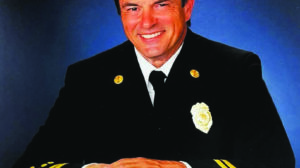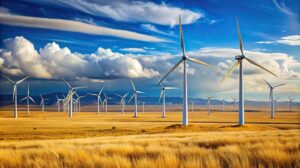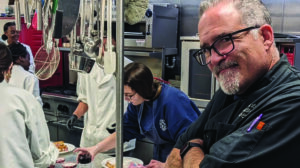“Reinvent yourself” is a phrase heard by plenty of baby boomers as they contemplate their careers and their future.Donna and Dennis Duncan have done just that.Donna Duncan has a degree in biology and once worked for Digital Equipment Corp. Today, she teaches high school after getting a master’s degree in education.Dennis Duncan trained as a Korean interpreter in the U.S. Army and has a graduate degree in computer science. He also worked for Digital and held senior management positions at Apollo Computer and Eastman-Kodak. Now, he teaches math and computer science at the University of Colorado at Colorado Springs and Pikes Peak Community College.Nineteen years ago, the Duncans moved to their Black Forest home on 5 acres; and, in addition to teaching, are operating a pick-your-own organic rhubarb farm.Rhubarb is an heirloom vegetable, where the edible part – the stalk – is so tart it requires sweetening, making rhubarb an ingredient in many desserts.Chance led the Duncans to rhubarb.”We had a 2,000-square-foot vegetable garden and a friend gave us a handful of rhubarb roots,” Dennis Duncan said.The friend had been gardening in the area for 50 years, but her plants never grew as big as they have in the Duncans’ garden.”When they turned into giants, I thought ‘I’ve discovered something,'” Duncan said. Rhubarb seems to be one of a few crops that thrive at 7,800 feet in the face of erratic weather, pocket gophers and water concerns, he added.That was 12 years ago. Since then, the Duncans have been perfecting their rhubarb-growing technique.”The original plants were planted the way most people plant rhubarb – at ground level in soil heavily enriched with compost.”Rhubarb is a heavy feeder and depletes the soil after four years. To be organic, you have to dig them up and re-amend the soil,” Duncan said. “When you do that, you’re three years from your next harvest.”After years of experimentation, Duncan developed a different system.He starts a new patch by spreading a thick layer of mature sheep and cow manure and tilling it to a depth of 6 to 8 inches. He then forms the soil into mounds 2 feet high and 6 feet apart. After slightly flattening each mound, he plants a rhubarb root on top.The spaces between the mounds are filled in with mulch from the Black Forest Slash and Mulch program.”I’m probably one of their biggest customers. We had 30 pickup truckloads dumped last year,” Duncan said.The mulch prevents weeds from growing, amends the soil as it decomposes and keeps watering to a minimum.”I only water three to five times a year, with the big plants getting 10 gallons each time. The small ones get half that,” he said.Along the way, the Duncans adopted a rhubarb from a man who lived within the Rocky Mountains.”It was brought out by his grandparents when they homesteaded out here,” Duncan said. “He was living in their cabin but decided to move to Montana. He didn’t want to see it neglected, so he gave it to me as long as I promised to take care of it.”By 2008, the Duncans were growing enough rhubarb to start selling it.”We wanted to retire here, and we can’t retire with the utility bills and property taxes, so I thought maybe we can get a small hobby farm going,” Duncan said.First, Duncan approached Whole Foods.”They said they’d buy our whole crop for $3.50 a pound, but I had to pick, box and deliver it in Denver,” he said. “So, I thought I’d try selling to people who want to pick their own rhubarb.”This is the third year the Duncans have opened their farm to the public.”On harvest day, Donna makes a couple of dishes for people to sample, like rhubarb brownies and rhubarb coffee cake, and I make rhubarb iced tea,” Duncan said. “We set up picnic tables and umbrellas so people can have their lunch and pick rhubarb after we show them how.”Rhubarb has a unique taste that’s hard to describe. It’s very subtle and it’s pretty tart. People tell me stories of when they were young having a stick of rhubarb dipping it in a bowl of sugar, but we make our dishes with honey.”This year, the Duncans’ rhubarb harvest kicks off June 5 and June 6 at their Black Forest farm at 7225 Wildridge Road. The farm is open to the public from 8 a.m. to 2 p.m. and every weekend until the rhubarb runs out or it’s the end of the growing season, which is August. Check the Web site, www.highaltituderhubarb.com, or call 719-494-8424 to verify availability.Pickers will have seven varieties to choose from, including the giant “Victoria” variety, some more tart than others. All varieties are sold, after trimming, for $3 lb.But don’t wait too long. The Duncans just received an order from Salt Lake City for 90 lbs. – the equivalent of one plant’s output for the season. They’ve gotten orders from Illinois and Tennessee, too.So far, the Duncans haven’t done a lot to promote their business.”I didn’t want to have more customers than rhubarb. If people came out and are turned away, they’re unlikely to come back,” he said.However, they added a second patch that goes into production this year, so they’ll have 20 or 30 percent more rhubarb than last year.”I’m at the point now where it’s a business decision,” Duncan said.”The farm has exceeded my expectations so much that I have to decide if I want to take the next step and get big enough to hire people.”He’s mulling over decisions, such as becoming certified as an organic farm (several thousand dollars) and ordering a cloth to protect the plants from the sort of hail that wiped out the second half of last year’s growing season.Whatever, the Duncans are all about reinvention.






